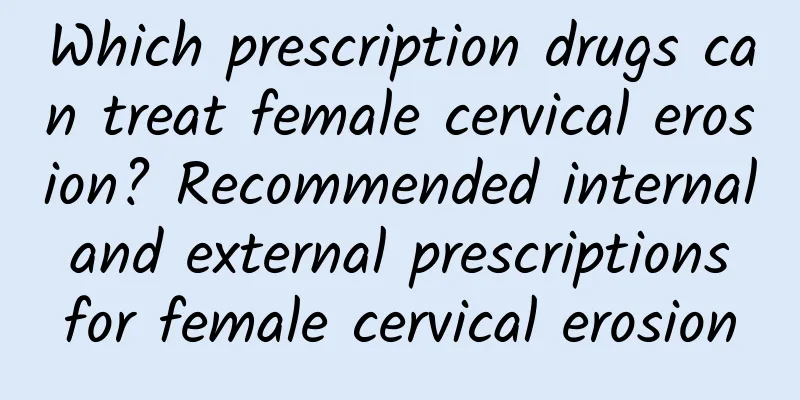What tests should be done after miscarriage?

|
With the development of society, many women take abortion too lightly, and even use abortion as a means of contraception! Many women do not pay attention to the maintenance of their bodies after abortion, and always rush through it. Little do they know that this is an important cause of infertility. In order to ensure good health, let's learn what examinations need to be done after abortion today? Recommended tests for patients with miscarriage: 1. Chromosome testing of aborted embryos or tissues. Why is this put first? Because the main reasons for each embryo miscarriage may be different, and chromosomes are the most important reason. 60%-70% of miscarriages are due to abnormal embryo chromosomes. Therefore, checking embryo chromosomes is the first-hand basis for predicting the risk of next miscarriage. Some hidden chromosome translocations can only be discovered by checking aborted tissues. Currently, most embryo chromosome tests are to extract DNA for gene chips or second-generation sequencing to check for abnormal chromosome copy numbers, which is not limited by the traditional chorionic villus cell culture method with high detection conditions, high failure rate and limited detection range. 2. Chromosomes of both spouses. The first line of testing for recurrent miscarriage. 3.TORCH. Eugenic screening, including detection of multiple pathogens such as Toxoplasma gondii TOX, rubella virus RUV, cytomegalovirus CMV, herpes simplex virus, etc. 4. Gynecological B-ultrasound. Hysterosalpingography (HSG) if necessary. Check for anatomical abnormalities. 5. Gynecological examination. Including tests for vaginitis (routine leucorrhea + BV), cervicitis, cervical HPV, chlamydia, mycoplasma, gonorrhea, etc. 6. Endocrine testing. Including basic endocrine testing on the 3rd to 5th day of menstruation, luteal phase progesterone testing, luteal function testing, thyroid hormone testing, etc. 7. Glucose tolerance and insulin resistance testing. 8. Blood lipid, liver and kidney function tests. 9. Identification of folate genotype and determination of homocysteine. 10. Antibody screening. Including anti-cardiolipin antibodies (ACA), anti-beta-2 glycoprotein antibodies, autoimmune antibody (ANA) antibody spectrum, anti-endometrial antibodies (EMAb) and other tests. 11. Coagulation function and D-dimer testing. 12. Blood type test for both husband and wife. The above items may be slightly different in different hospitals and medical centers. Patients can undergo selective testing based on their own conditions and physician recommendations. |
<<: Can I detect it after medical abortion?
>>: Nursing care for female patients with miscarriage
Recommend
Can dysmenorrhea cause female infertility?
Nowadays, many people simply regard dysmenorrhea ...
How does Traditional Chinese Medicine treat infertility caused by hyperprolactinemia?
How does TCM treat infertility caused by hyperpro...
How to treat uterine fibroids in women?
How should women with uterine fibroids be treated...
Is irregular bleeding caused by uterine fibroids? Treatment of uterine fibroids
Ms. Fan, who is in her 30s, had persistent irregu...
Swimming helps you lose weight faster! 6 freestyle swimming strokes to help you lose weight
Have you been in the water this summer? Don’t jus...
How big is the ovarian cyst that does not require surgery?
How big does an ovarian cyst have to be before it...
Is the success rate of premature ovarian failure high?
Is the success rate of premature ovarian failure ...
Can adnexitis after abortion be cured?
Can adnexitis after abortion be cured? Female rep...
What is the reason for heavy menstrual flow?
What is the reason for heavy menstrual flow? Fema...
Spring detox apples are a magic weapon! Apples for weight loss, which is better, red or green apples? 5 must-read articles
Did you know that spring is the perfect time to d...
How should patients with thick endometrium pay attention to their diet?
Patients with endometrial thickening should avoid...
What are the symptoms before vulvar leukoplakia turns cancerous?
Vulvar leukoplakia generally refers to white lesi...
The moon is round, but I am not! Eat mooncakes to avoid gaining weight, remember these 5 tips
The Mid-Autumn Festival is approaching. Mooncake ...
Causes of pelvic inflammatory disease in women
Causes of pelvic inflammatory disease in women: F...
Will a molar pregnancy grow again after surgery?
Mole may grow again after surgery, and prevention...









